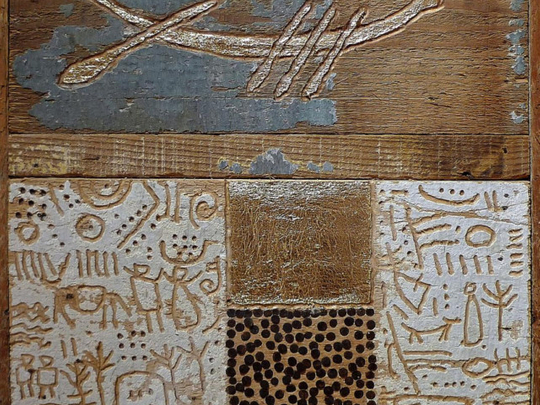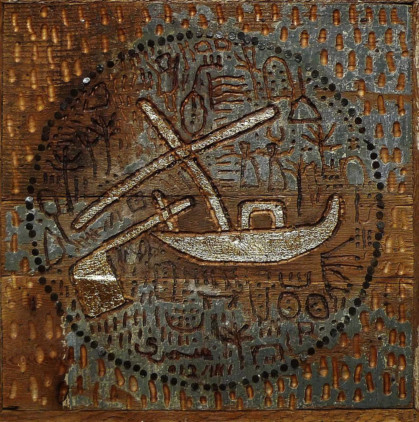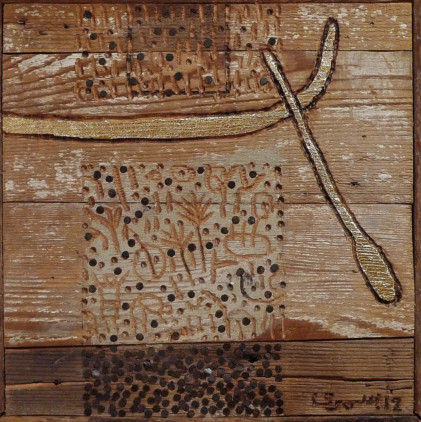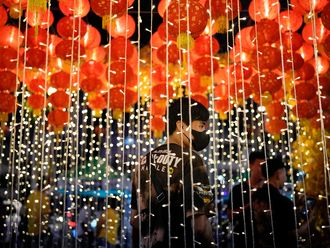
Ayman Elsemary grew up in a farming community on the banks of the river Nile. Although he now lives in Cairo, the materials he uses and the themes he addresses in his work are closely connected with his rural roots. His first solo exhibition in Dubai, titled “The Journey”, features a series of artworks created on wooden ceilings obtained from abandoned rural homes.
The artist travels back in time to trace the history of Egypt’s ancient culture, contemplating his personal journey in the context of the evolution of one of the oldest civilisations in the world. Using the metaphor of a boat, he takes us on a voyage from the past to the present, highlighting the need to appreciate the value of the past and to understand its relevance in the present.
Elsemary has taken great care to retain the original weathered look of the wood and the many layers of peeling paint on it. Elsemary says, “These ceilings come from houses that are more than 150 years old. The first ceiling I used was from my grandfather’s house, so this material is very nostalgic for me, and has a lot of history and meaning. The farmers always used natural materials to build and paint their homes. They usually put a new layer of paint on the walls and ceilings during festivals and weddings, but without removing the older layers, which can still be seen below the scratches.
“There is a lot of history stored within these pieces of reclaimed wood, and that has to be respected. I am afraid to touch these pieces because I can smell my civilisation in them. Before I begin working on the surface, I have a dialogue with it and I allow it to dictate the composition. I avoid putting any other colours that will detract from the ancient pastel colours, and use only some gold leaf and engravings to express myself.”
The main motif in this series is “the boat”, which appears in every artwork as a symbol of a journey as well as of Egyptian culture. Elsemary has done extensive research on the subject to recreate the boats that have sailed on the Nile through the ages, going right back to the Naqada period before the Pharaohs. The boats of various shapes and sizes, including the artist’s own hybrid and abstract versions are either carved into the reclaimed wood or rendered with glittering gold leaf.
“I came across many different types of boats used by Egyptians over the centuries, including large boats with many oarsmen, which indicate that we have never been a closed society and Egyptians have always travelled outside the country and interacted with other cultures. I have done the boats in gold leaf to show how precious this symbol of the openness and richness of our culture is,” he says.
Around the boats, the artist has carved many hieroglyph-like symbols depicting farmers, fishermen, palm trees, grain silos, irrigation systems, musical instruments and farm animals. In one artwork these symbols are all placed inside a boat. “As cities expand and industrialisation spreads to rural areas, I am afraid that the way of life I remember from my childhood will soon disappear. By putting all these elements in this Noah’s Ark, I want to preserve this aspect of my culture,” he says.
Other recurring motifs in Elsemary’s work are squares and circles, nails hammered into the wood, and holes drilled in the wood. “The square is an abstracted version of the pyramids and represents balance and a safe, private space, where I can hide the things I am afraid of losing. And the circle is a complete shape representing beauty. The nails are objects that have been a part of our life from ancient times and I use them to bind together the past and present. And the dark holes invite viewers to look beyond the surface at the depth of our culture,” he says.
“This show is about having an open mind, communicating with others and respecting others. Rather than talking about the present turmoil in my country, I want to focus on our rich heritage. I want to bring alive the past to make people think about what is happening in contemporary times,” he concludes.
The Journey will run at Gallery Ward Dubai in Al Quoz till November 6.
Jyoti Kalsi is an arts enthusiast based in Dubai.













